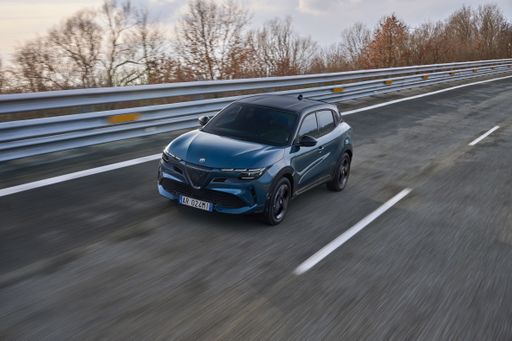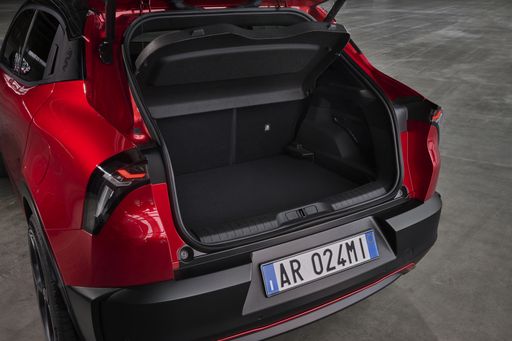Alfa Romeo Junior vs Hyundai IONIQ 9 – Which model is better for everyday use?
Compare performance, boot capacity, efficiency and price at a glance.
Find out which car is the better choice for you – Alfa Romeo Junior or Hyundai IONIQ 9?
Costs and Efficiency:
Price and efficiency are key factors when choosing a car – and this is often where the real differences emerge.
Alfa Romeo Junior has a convincingly advantage in terms of price – it starts at 25700 £, while the Hyundai IONIQ 9 costs 58700 £. That’s a price difference of around 33043 £.
In terms of energy consumption, the advantage goes to the Alfa Romeo Junior: with 15.10 kWh per 100 km, it’s distinct more efficient than the Hyundai IONIQ 9 with 19.90 kWh. That’s a difference of about 4.80 kWh.
As for range, the Hyundai IONIQ 9 performs noticeable better – achieving up to 620 km, about 210 km more than the Alfa Romeo Junior.
Engine and Performance:
Under the bonnet, it becomes clear which model is tuned for sportiness and which one takes the lead when you hit the accelerator.
When it comes to engine power, the Hyundai IONIQ 9 has a evident edge – offering 428 HP compared to 280 HP. That’s roughly 148 HP more horsepower.
In acceleration from 0 to 100 km/h, the Hyundai IONIQ 9 is to a small extent quicker – completing the sprint in 5.20 s, while the Alfa Romeo Junior takes 5.90 s. That’s about 0.70 s faster.
In terms of top speed, the Alfa Romeo Junior performs barely noticeable better – reaching 206 km/h, while the Hyundai IONIQ 9 tops out at 200 km/h. The difference is around 6 km/h.
There’s also a difference in torque: Hyundai IONIQ 9 pulls decisively stronger with 700 Nm compared to 345 Nm. That’s about 355 Nm difference.
Space and Everyday Use:
Whether family car or daily driver – which one offers more room, flexibility and comfort?
Seats: Hyundai IONIQ 9 offers clearly perceptible more seating capacity – 7 vs 5.
In curb weight, Alfa Romeo Junior is decisively lighter – 1380 kg compared to 2594 kg. The difference is around 1214 kg.
In terms of boot space, the Alfa Romeo Junior offers to a small extent more room – 415 L compared to 338 L. That’s a difference of about 77 L.
In maximum load capacity, the Hyundai IONIQ 9 performs clearly better – up to 2419 L, which is about 1139 L more than the Alfa Romeo Junior.
When it comes to payload, Hyundai IONIQ 9 distinct takes the win – 643 kg compared to 420 kg. That’s a difference of about 223 kg.
Who comes out on top?
Overall, the Hyundai IONIQ 9 shows itself to be outperforms in nearly all aspects and secures the title of DriveDuel Champion.
It convinces with the more balanced overall package and proves to be the more versatile choice for everyday use.

Hyundai IONIQ 9
Alfa Romeo Junior
The Alfa Romeo Junior captures the essence of Italian design with its sleek lines and compact dimensions, making it an icon of elegance and performance. With a spirited driving experience and a charming retro aesthetic, it appeals to enthusiasts and casual drivers alike. This delightful car embodies the brand's rich heritage while remaining a fun and engaging option for those seeking a unique automotive experience.
details @ Alfa Romeo / Stellantis Media
@ Alfa Romeo / Stellantis Media
 @ Alfa Romeo / Stellantis Media
@ Alfa Romeo / Stellantis Media
 @ Alfa Romeo / Stellantis Media
@ Alfa Romeo / Stellantis Media
Hyundai IONIQ 9
The Hyundai IONIQ 9 is a bold step forward in the automotive world, combining cutting-edge electric technology with a sleek and modern design. This model stands out with its spacious interior and advanced features, ensuring both comfort and convenience for drivers and passengers alike. As Hyundai pushes the envelope in eco-friendly innovation, the IONIQ 9 represents the future of sustainable driving with its impressive range and performance capabilities.
details
 @ Alfa Romeo / Stellantis Media
@ Alfa Romeo / Stellantis Media
|
|
|
|
|
Costs and Consumption |
|
|---|---|
|
Price
25700 - 41600 £
|
Price
58700 - 74400 £
|
|
Consumption L/100km
4.8 - 5.4 L
|
Consumption L/100km
-
|
|
Consumption kWh/100km
15.1 - 17.5 kWh
|
Consumption kWh/100km
19.9 - 20.6 kWh
|
|
Electric Range
344 - 410 km
|
Electric Range
600 - 620 km
|
|
Battery Capacity
0.4 - 51 kWh
|
Battery Capacity
110 kWh
|
|
co2
0 - 119 g/km
|
co2
0 g/km
|
|
Fuel tank capacity
44 - 45 L
|
Fuel tank capacity
-
|
Dimensions and Body |
|
|---|---|
|
Body Type
SUV
|
Body Type
SUV
|
|
Seats
5
|
Seats
7
|
|
Doors
5
|
Doors
5
|
|
Curb weight
1380 - 1689 kg
|
Curb weight
2594 - 2689 kg
|
|
Trunk capacity
340 - 415 L
|
Trunk capacity
338 L
|
|
Length
4173 mm
|
Length
5060 mm
|
|
Width
1781 mm
|
Width
1980 mm
|
|
Height
1505 - 1538 mm
|
Height
1790 mm
|
|
Max trunk capacity
1205 - 1280 L
|
Max trunk capacity
2419 L
|
|
Payload
390 - 420 kg
|
Payload
586 - 643 kg
|
Engine and Performance |
|
|---|---|
|
Engine Type
Electric, Petrol MHEV
|
Engine Type
Electric
|
|
Transmission
Automatic
|
Transmission
Automatic
|
|
Transmission Detail
Dual-Clutch Automatic, Reduction Gearbox
|
Transmission Detail
Reduction Gearbox
|
|
Drive Type
Front-Wheel Drive, All-Wheel Drive
|
Drive Type
Rear-Wheel Drive, All-Wheel Drive
|
|
Power HP
136 - 280 HP
|
Power HP
218 - 428 HP
|
|
Acceleration 0-100km/h
5.9 - 9.1 s
|
Acceleration 0-100km/h
5.2 - 9.4 s
|
|
Max Speed
150 - 206 km/h
|
Max Speed
190 - 200 km/h
|
|
Torque
230 - 345 Nm
|
Torque
350 - 700 Nm
|
|
Number of Cylinders
3
|
Number of Cylinders
-
|
|
Power kW
100 - 207 kW
|
Power kW
160 - 315 kW
|
|
Engine capacity
1199 cm3
|
Engine capacity
-
|
General |
|
|---|---|
|
Model Year
2024 - 2025
|
Model Year
2025
|
|
CO2 Efficiency Class
A, C, D
|
CO2 Efficiency Class
A
|
|
Brand
Alfa Romeo
|
Brand
Hyundai
|
What drive types are available for the Alfa Romeo Junior?
Available configurations include Front-Wheel Drive or All-Wheel Drive.
The prices and data displayed are estimates based on German list prices and may vary by country. This information is not legally binding.
